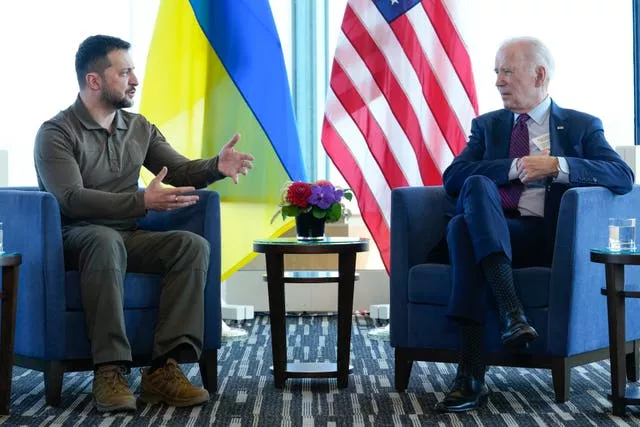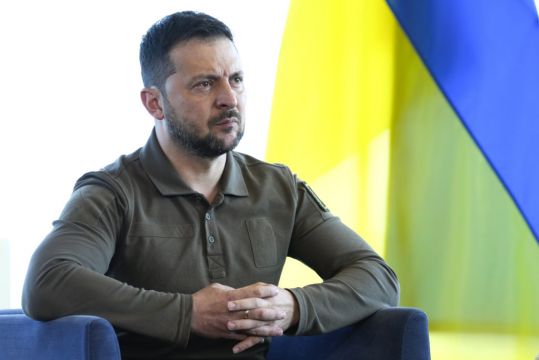Ukrainian President Volodymyr Zelensky confirmed on Sunday that Russia has taken control of the city of Bakhmut after a bloody eight-month battle by Moscow’s Wagner private army, with the support of Russian troops, that has left it in ruins.
Speaking alongside US President Joe Biden at the Group of Seven summit in Hiroshima, Japan, Mr Zelensky said the Russians had destroyed “everything”.
“You have to understand that there is nothing,” he said.
“For today, Bakhmut is only in our hearts. There is nothing in this place.”
Mr Zelensky’s comments came as Biden announced 375 million dollars (£301 million) more in aid for Ukraine, which included more ammunition, artillery and vehicles.
“I thanked him for the significant financial assistance to (Ukraine) from (the US),” Mr Zelensky tweeted later.
In the framework of the participation in the #G7 Summit in Hiroshima, I met with the President of the United States @POTUS.
I thanked him for the significant financial assistance to 🇺🇦 from 🇺🇸, which totals $37 billion, and for the new military assistance package announced by…— Володимир Зеленський (@ZelenskyyUa) May 21, 2023
Russia’s defence ministry had said early on Sunday that forces of the Wagner private army, with the support of Russian troops, had seized Bakhmut.
The ministry statement on the Telegram channel came about eight hours after a similar claim by Wagner head Yevgeny Prigozhin.
Ukrainian authorities at that time said fighting for Bakhmut was continuing.
The eight-month battle for the city in eastern Ukraine is the longest and probably most bloody of the conflict in Ukraine.
Using the city’s Soviet-era name, the Russian ministry said, “In the Artyomovsk tactical direction, the assault teams of the Wagner private military company with the support of artillery and aviation of the southern battlegroup has completed the liberation of the city of Artyomovsk.”

Russian state news agencies cited the Kremlin’s press service as saying President Vladimir Putin “congratulates the Wagner assault detachments, as well as all servicemen of the Russian Armed Forces units, who provided them with the necessary support and flank protection, on the completion of the operation to liberate Artyomovsk.”
In a video posted earlier on Telegram, Wagner head Yevgeny Prigozhin said the city came under complete Russian control at about midday on Saturday.
He spoke flanked by about a half dozen fighters, with ruined buildings in the background and explosions heard in the distance.
Fighting has raged in and around Bakhmut for more than eight months.

Russian forces will still face the massive task of seizing the remaining part of the Donetsk region still under Ukrainian control, including several heavily fortified areas.
It is not clear which side has paid a higher price in the battle for Bakhmut. Both Russia and Ukraine have endured losses believed to be in the thousands, though neither has disclosed casualty numbers.
Mr Zelensky underlined the importance of defending Bakhmut in an interview with The Associated Press in March, saying its fall could allow Russia to rally international support for a deal that might require Kyiv to make unacceptable compromises.
Analysts have said Bakhmut’s fall would be a blow to Ukraine and give some tactical advantages to Russia but would not prove decisive to the outcome of the war.
Russian forces still face the enormous task of seizing the rest of the Donetsk region under Ukrainian control, including several heavily fortified areas.
The provinces of Donetsk and neighboring Luhansk make up the Donbas, Ukraine’s industrial heartland where a separatist uprising began in 2014 and which Moscow illegally annexed in September.
Bakhmut, located about 34 miles north of the Russian-held regional capital of Donetsk, had a prewar population of 80,000 and was an important industrial centre, surrounded by salt and gypsum mines.
The city, which was named Artyomovsk after a Bolshevik revolutionary when Ukraine was part of the Soviet Union, was also known for its sparkling wine production in underground caves.

Its broad tree-lined avenues, lush parks and stately downtown with imposing late 19th-century mansions — all now reduced to a smouldering wasteland — made it a popular tourist destination.
When a separatist rebellion engulfed eastern Ukraine in 2014 weeks after Moscow’s illegal annexation of Ukraine’s Crimean Peninsula, the rebels quickly won control of the city, only to lose it a few months later.
After Russia switched its focus to the Donbas following a botched attempt to seize Kyiv early in the February 2022 invasion, Moscow’s troops tried to take Bakhmut in August but were pushed back.
The fighting there abated in autumn as Russia was confronted with Ukrainian counteroffensives in the east and the south, but it resumed at full pace late last year.
In January, Russia captured the salt-mining town of Soledar, just north of Bakhmut, and closed in on the city’s suburbs.
Intense Russian shelling targeted the city and nearby villages as Moscow waged a three-sided assault to try to finish off the resistance in what Ukrainians called “fortress Bakhmut”.
Mercenaries from Wagner spearheaded the Russian offensive. Mr Prigozhin tried to use the battle for the city to expand his clout amid the tensions with the top Russian military leaders whom he harshly criticised.
“We fought not only with the Ukrainian armed forces in Bakhmut. We fought the Russian bureaucracy, which threw sand in the wheels,” Mr Prigozhin said in the video on Saturday.
The relentless Russian artillery bombardment left few buildings intact amid ferocious house-to-house battles. Wagner fighters “marched on the bodies of their own soldiers” according to Ukrainian officials.
Both sides have spent ammunition at a rate unseen in any armed conflict for decades, firing thousands of rounds a day.
Russian Defence Minister Sergei Shoigu has said that seizing the city would allow Russia to press its offensive further into the Donetsk region, one of the four Ukrainian provinces that Moscow illegally annexed in September.







